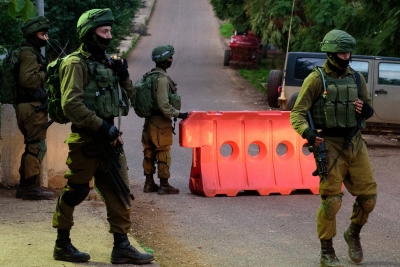Lebanon pushes ahead with local elections despite border conflict, displacement
By IANS | Updated: May 24, 2025 20:38 IST2025-05-24T20:31:01+5:302025-05-24T20:38:04+5:30
Beirut, May 24 Lebanon is moving forward with municipal elections in its conflict-ravaged south on Saturday, pressing ahead ...

Lebanon pushes ahead with local elections despite border conflict, displacement
Beirut, May 24 Lebanon is moving forward with municipal elections in its conflict-ravaged south on Saturday, pressing ahead despite ongoing Israeli airstrikes, widespread displacement, and severe logistical challenges.
The vote is held in the governorates of South Lebanon and Nabatieh, even as large parts of the border region remain under sporadic fire. Tens of thousands have been displaced since the cross-border conflict between Israel and Hezbollah began in October 2023, and basic services have collapsed in many towns.
Interior Minister Ahmad Al-Hajjar this week reiterated the government's commitment to asserting sovereignty across all Lebanese territory. He said discussions were underway with international mediators to help ensure a calm election day, but stressed that Beirut "does not wait for guarantees."
Still, organisers face daunting challenges. According to the Southern Border Villages Association, the displacement of residents has made voting logistics nearly unmanageable. The Interior Ministry says 37 out of 60 border villages remain empty, with polling stations relocated to safer areas. The association also cited the reluctance of election supervisors-legally required to come from outside the region-to travel to volatile zones due to the threat of Israeli drone strikes.
"The lack of security, coupled with the absence of water, electricity, and telecom services, has created an atmosphere of fear," the group said in a statement.
Despite these hurdles, the elections are seen as a key test of Lebanon's ability to uphold democratic practices amid escalating conflict. Analysts say the vote is also a symbolic assertion of state authority in areas where Hezbollah and its allies wield significant influence.
"These elections are not just symbolic," said Refaat Badawi, a political analyst and former adviser to the late Prime Minister Salim el-Hoss. "Municipalities are on the front lines of service delivery, aid distribution and reconstruction efforts -- especially in the near-total absence of a functioning central government."
The vote takes place in Hezbollah and Amal strongholds, offering a crucial measure of their grassroots support after months of Israeli bombardments. Badawi said the results may signal trends ahead of the 2026 parliamentary elections. Parliament Speaker Nabih Berri, also leader of the Amal Movement, has urged residents of the south to vote in large numbers in support of his party, Xinhua news agency reported.
Nidal Issa, a resident of the border village of Kfarchouba, said more than 100 towns have already formed municipal councils unopposed, with efforts underway to increase that number to 150. In Marjayoun, Bint Jbeil and Hasbaya districts alone, 35 councils were created through consensus.
"In many places, parties avoided electoral contests by brokering deals with influential families and clans," Issa said. "It eases tensions and strengthens their grip on local power, especially in sensitive border areas."
Issa also appealed for international monitoring. "Voting under airstrikes robs people of their right to choose freely," he said, calling on the United Nations Interim Force in Lebanon and the five-nation ceasefire committee to press Israel to halt attacks during the vote.
Although a French- and US-brokered ceasefire between Hezbollah and Israel has been in place since November 2024, sporadic Israeli strikes have continued.
Israel says its strikes are aimed at neutralizing threats from Hezbollah. However, the Lebanese government and several Arab states have accused Israel of repeatedly violating the agreement. Despite provisions in the ceasefire requiring a full Israeli withdrawal, Israeli forces continue to occupy several strategically important positions in southern Lebanon.
Disclaimer: This post has been auto-published from an agency feed without any modifications to the text and has not been reviewed by an editor
Open in app